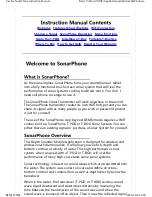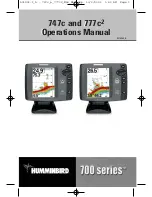
65
the factory defaults. See the default settings on page 63.
2.
If the power wiring includes a fuse, it may be blown. Also check the
circuit breaker or main battery switch.
3.
You may have reversed the power connections. Follow the DC power
lines all the way back to the battery. The red wire should connect to
the positive terminal (+) on the battery or power source, and the black
wire should connect to the negative terminal (-) (also called “ground”
or “earth”). If the polarity is not correct, reconnect the leads properly
and check again.
4.
The battery or DC power source may not be producing the correct
voltage. The FishFinder needs at least 11 volts to operate. If the
voltage is lower, check for loose or corroded connections, or a
problem with the power source.
The display unit “freezes” (temporarily or permanently) –
1.
Check that the display has not been stopped using the Chart Speed
setting. (If the adjustment bar is moved all of the way to the left, the
display will freeze.)
2.
A source of electrical “noise” may be interfering with the unit’s
operation. Both the transducer cable and the power cable for the
FishFinder should be routed as far as possible from all other wiring on
the boat.
To locate the source of the noise, turn on the FishFinder. Next, turn
on each electrical device on the boat, but just supply power to one
device at a time. This may reveal the cause of the problem. Move
the FishFinder, the other unit, or the wiring. A movement of just a few
inches can make a big difference. If it is necessary to cross any
wires, make the crossing at a right angle.
Start the motor in neutral and increase the RPM speed. This can
reveal a problem with the wiring for the boat’s ignition, alternator, or
tachometer. It may help to use resistor-type spark plugs or spark plug
cables on the boat’s motor. You can also try a noise-suppression filter
on the alternator.
3.
One of the wiring connections may be loose. All of the connections
should be clean, tight, and insulated. Soldering is the best way of
making these connections. Protect each connection with a piece of
shrink-wrap tubing.
Maintenance and Troubleshooting






























